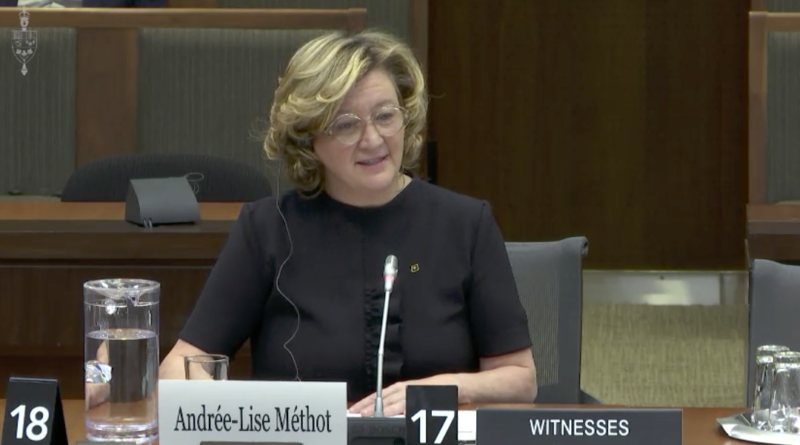Former Director of the Federal Green Fund Resigns from Infrastructure Bank after Allocating Funds to Own Companies
A director appointed by the government at the Canada Infrastructure Bank has resigned amidst controversy for approving federal green fund money to companies she had investments in while serving as a fund director.
The resignation of renewable energy venture capitalist Andrée-Lise Méthot on April 16 was only made public when Housing and Infrastructure Minister Sean Fraser addressed the issue on May 21 during his testimony before the House of Commons transport and infrastructure committee.
During questioning by Conservative Party MP Michael Barrett, Minister Fraser was asked about endorsing Ms. Méthot’s service on the Canada Infrastructure Bank (CIB).
“I understand that the individual has resigned, so there is no longer any service to endorse,” replied Minister Fraser, who oversees the Crown corporation as part of his duties.
Mr. Barrett also inquired whether the resignation was linked to an investigation, to which Mr. Fraser denied any such announcement.
Ms. Méthot had previously served on the board of the federal green fund Sustainable Development Technology Canada (SDTC) from 2016 to 2021, during which time the fund provided financial support to companies in which she had investments. Other SDTC directors are currently under investigation by the ethics commissioner for similar actions.
Ms. Méthot, the founder and managing partner at investment firm Cycle Capital—where now-Environment Minister Steven Guilbeault had previously worked—was appointed to the CIB board in late 2022.
Accusations by Conservatives claim that she approved $42.5 million of SDTC funds to companies in which Cycle Capital had stakes. During her testimony before the Commons industry committee, Ms. Méthot contested this figure.
She clarified that while serving as an SDTC director, four companies in Cycle Capital’s portfolio received funds totaling $10.7 million. Additionally, one Cycle Capital portfolio company had received SDTC funds before her appointment to the board.
“I always recused myself whenever a potential or actual conflict of interest was declared. This was standard procedure,” she informed the committee.
Neither Ms. Méthot nor the CIB responded to requests for comment at the time of publication.
Revelations of improper actions at SDTC were initially brought to light through a whistleblower complaint. During testimony before a parliamentary committee in December, an anonymous whistleblower disclosed that nearly $150 million in taxpayer funds were inappropriately distributed to private companies, some with direct ties to the fund’s top leadership.
In response to these allegations and independent fact-finding, Industry Minister François-Philippe Champagne announced a temporary halt to future funding via SDTC in October. While no changes to leadership were announced, key executives resigned in the ensuing weeks amid scrutiny, including during committee hearings.
An investigation by Ethics Commissioner Konrad von Finckenstein is underway regarding former board chair Annette Verschuren and former director Guy Ouimet at SDTC. The ethics committee informed the Commons that the investigations would conclude before August 1.
Former SDTC CEO Leah Lawrence resigned in November citing targeted attacks against her. In January, she revealed to a House committee that then-Industry Minister Navdeep Bains had approved Ms. Verschuren’s board appointment while aware of her company receiving support from the fund.
The Canada Infrastructure Bank (CIB) has been embroiled in its own controversies. The bank’s establishment was backed by the former Liberal Advisory Council on Economic Growth, chaired by ex-McKinsey consulting firm head Dominic Barton with McKinsey serving as the council’s secretariat.
Michael Sabia, former president of the Quebec pension fund CDPQ, collaborated with Mr. Barton on the council. Post its creation, McKinsey secured a $1.43 million contract with the CIB, and Mr. Sabia assumed the role of bank chair. The CIB’s major project is the REM light-rail in the Montreal region, with CDPQ being the largest stakeholder. The current CIB CEO, Ehren Cory, is a former McKinsey partner.





